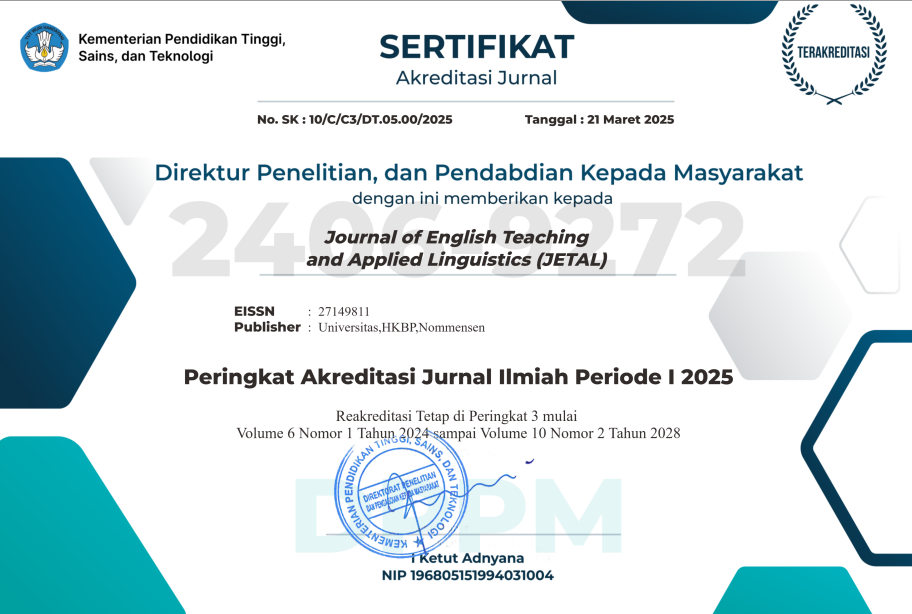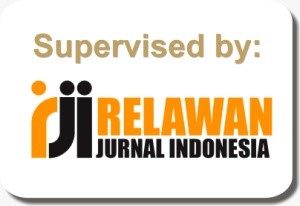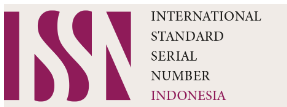EFL STUDENTS’ EXPERIENCE OF PICTURE SERIES COLLABORATIVE NARRATIVE WRITING: HIGHLIGHTING INDONESIAN VOCATIONAL HIGH SCHOOL STUDENTS’ VOICE
: Highlighting Students’ Voice
Abstract
In education research, positive attention has been paid to the role of picture series collaborative writing methods to improve students’ writing achievement. To fill this gap, the present study applied the approach of narrative inquiry and explored how students experience collaborative narrative writing activity. Six graders from a vocational school in Central Java, Indonesia participated in this study. Data were collected through semi-structured interviews. For analyzing the data, the researcher employed thematic analysis by Brown and Clarke (2006). The result of this study showed that there were different perspectives for each participant in how they write narrative text through picture series collaboration. The finding can be a consideration for teachers who will use this media for teaching.
References
Group Assignments in a EFL/ESL Classroom.
English Linguistics Research, 3, 1–17.
Braun, V., & Clarke, V. (2006). Using Thematic
Analysis in Psychology. Research in Psychology,
3(2), 77–101.
Bunderson, S. J., & Reagans, E. R. (2011). Power,
status, and learning in organizations.
Organization Science, 22(5), 1181–1194.
Clandinin, D. J. (2006). Narrative Inquiry: A
Methodology for Studying Lived Experience.
Research Studies in Music Education, 27, 44–54.
https://doi.org/http://doi.org/10.1177/1321103X0
60270010301
Cooper, L. (2017). Social Emotional Learning: The
Impacts of an Implemented Plan at a Private
Christian School in the Urban Setting. Dordt
College.
Creswell, J. . (2012). Educational research: Planning,
conducting, and evaluating quantitative and
qualitative research (4th Ed). Pearson.
Destriana, F. A. (2018). Students;’ Perceptions
Towards Collaborative Learning Strategy in
Faculty of Language and Arts - UKSW.
Universitas Kristen Satya Wacana.
Dobao, F., & Blum, A. (2013). Collaborative Writing
in Pairs and Small Groups: Learners’ Attitude
and Perception. System, 41.
Erniwati, E., Mertosono, S. R., Rofiqoh, R., &
Gente, R. A. (2022). Picture Series in Teaching
Writing Skills: A Literature Review. Premise:
Journal of English Education, 11(3), 679.
https://doi.org/10.24127/pj.v11i3.5848
Faya, A. F. Al. (2020). Students’ Perception of the
Implementation Picture Series in Writing
Classroom. Journal of Intensive Studies on
Language, Literature, Art, and Culture, 4(2).
Ferdiansyah, S. (2018). Collaborative narrative
writing: A digital photography task in an
Indonesian Islamic secondary school. Indonesian
Journal of Applied Linguistics, 8(2), 303–315.
https://doi.org/10.17509/ijal.v8i2.13277
Gutiérrez, K. G. C., Puello, M. N., & Galvis, L. A. P.
(2015). Using pictures series technique to
enhance narrative writing among ninth grade
students at institución educativa simón araujo.
English Language Teaching, 8(5), 45–71.
https://doi.org/10.5539/elt.v8n5p45
Hasibuan, Z. Z. (2020). Students’ Problem in
Translating Narrative Text in IAIN
Lhokseumawe. JETAL: Journal of English
Teaching & Applied Linguistic, 1(2), 45–53.
https://doi.org/10.36655/jetal.v1i2.177
Kelly, S., Soundranayagam, L., & Grief, S. (2004).
Teaching and Learing Writing: A review of
research and practice. NRDC.
Kirschner, P., & Erkens, G. (2013). Toward a
framework for CSCL research. Educational
Psychologist, 48(1), 1–8.
Latifah, U., & Ulfa, S. M. (2020). The Effectiveness
of Using Collaborative Writing Strategy for
Writing Ability of Senior High School Students.
SELL Journal, 5(1), 1–18.
Linggarni, I. F. (2021). Picture Series Revealed
Students’ Ability In Writing Narrative Text To
The Junior High School Students. Proceedings of
The ICECRS, 9(5), 2021.
https://doi.org/10.21070/icecrs2021888
Marble, S. (2012). How Do Wordless Picture Books
Help Develop Writing For All Students? Fisher
Digital Publication.
Mayasari, E, A. (2014). Using Picture Series to
Improve the Writing Ability of the Eighth Grade
Students at SMP Negeri 2 Wonosari in the
Academic Year of 2013/2014. Yogyakarta State
University.
McDonough, K., Crawford, W., & DeVleeschauwer,
J. (2015). Thai EFL learners’ interaction during
collaborative writing tasks and its relationship to
text quality. In M. Sato & S. Ballinger (Eds.),
Peer interaction and second language learning:
Pedagogical potential and research agenda. John
Benjamins.
Nokes-Malach, T. J., Richey, J. E., & Gadgil, S.
(2015). When is it better to learn together?
Insights from research on learning. Educational
Psychology Review, 27(4), 645–656.
Pratiwi, D. (2016). Improving The Tenth Grade
Students’ Writing Skill By Using Picture Series.
Journal of English Language and Education,
2(1), 11–17.
Rezeki, Y. S., & Rahmani, F. E. (2021). The
Implementation of Collaborative Writing
Technique to Improve Students’ Writing
Performance and Soft Skills. Voices of English
Education Language Education Society, 5(2), 81–
94.
Sarwani, A. (2015). Narrative Text Sebagai Sumber
Belajar Mata Pelajaran Bahasa Inggris Untuk
Menumbuhkan Nilai Moral Peserta Didik.
LINGUA: Journal of Language, Literature and
Teaching, 12(2), 243–254.
https://doi.org/10.30957/lingua.v12i2.40
Satriani, W. (2021). The Effectiveness of Using
Picture Series in Teaching Writing Narrative
Text To the First Year Students at MAN 1
Makassar. Universitas Islam Negeri Alauddin
Makassar.
Setyowati, E. (2015). The Effect of Using Picture
Series Toward Students’ Ability in Writing
Narrative Text at SMA N 4 Tanjung Jabung
Timur.
Shimazoe, J., & Aldrich, H. (2010). Group work can
be gratifying: Understanding & overcoming
resistance to cooperative learning. College
Teaching, 58, 52–57.
https://doi.org/10.1080/87567550903418594
Stroch, N. (2002). Collaborative Writing: Product,
Process, and Students’ Reflections. Journal of
Second Language Writing, 14, 153–157.
Sukirman. (2016). Using Collaborative Writing in
Teaching Writing. Journal of The Assosiation for
Arabic and English, 2(1).
Susanti, Y., Sutapa, G., & Wardah. (2019).
Improving Students’ Writing Narrative Text by
Using Picture Series in Power Point
Presentation.
Vorobel, O., & Kim, D. (2017). Adolescent ELLs’
collaborative writing practices in face-to-face and
online contexts: From perceptions to action.
System, 65, 78–89.
https://doi.org/10.1016/j.system.2017.01.008
Widodo, H. . (2013). Implementating Collaborative
Process Based Writing in the EFL Collage
Classroom. Research Papers in Language
Teaching and Learning, 1(1), 198–206.
Yusnita, E., Sada, C., & Novita, D. (2012). Improving
Students Recount Text Writing By Using Picture
Series. Jurnal Pendidikan Dan Pembelajaran
Untan, 2(4).
Zhang, M. (2018). Collaborative Writing in the EFL
Classroom: The Effects of L1 and L2 Use.
Elsevier, 76, 1–12.
Authors retain copyright and grant the journal right of first publication with the work simultaneously licensed under a Creative Commons Attribution-ShareAlike 4.0 International License (CC BY-SA 4.0) that allows others to share the work with an acknowledgment of the work's authorship and initial publication in this journal.
Authors are able to enter into separate, additional contractual arrangements for the non-exclusive distribution of the journal's published version of the work (e.g., post it to an institutional repository or publish it in a book), with an acknowledgment of its initial publication in this journal.
Authors are permitted and encouraged to post their work online (e.g., in institutional repositories or on their website) prior to and during the submission process, as it can lead to productive exchanges, as well as earlier and greater citation of published work (See The Effect of Open Access).






